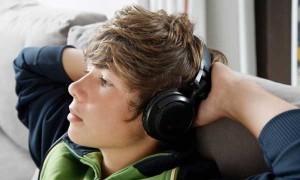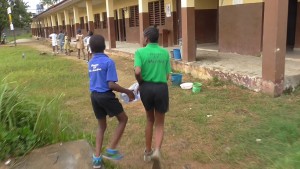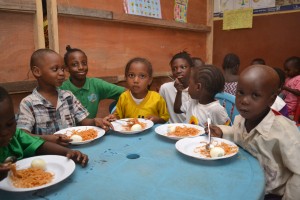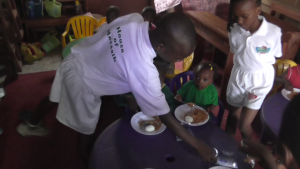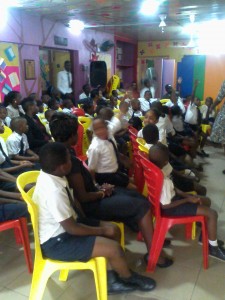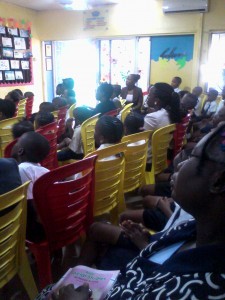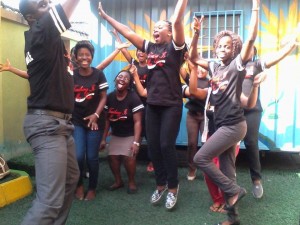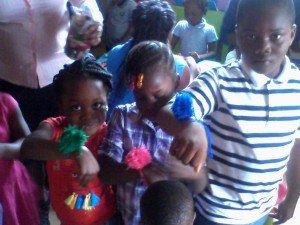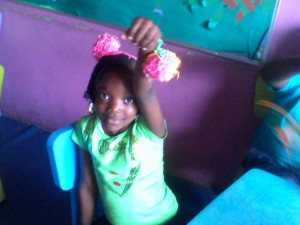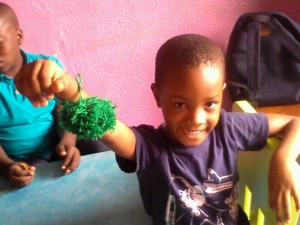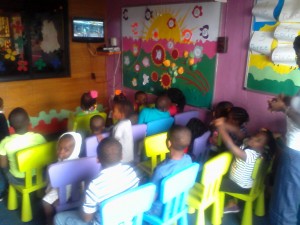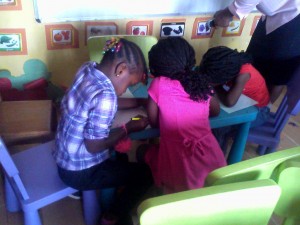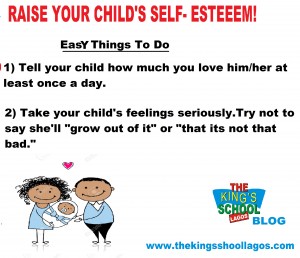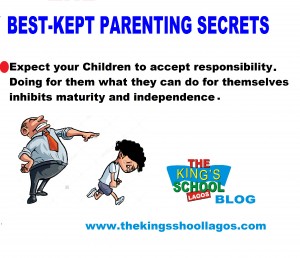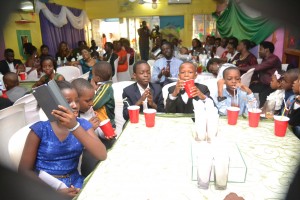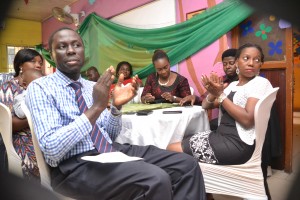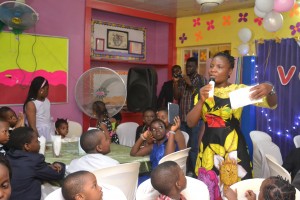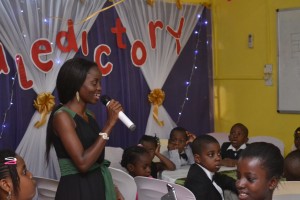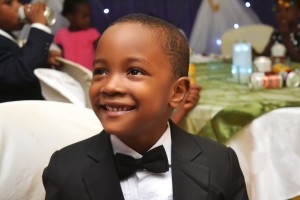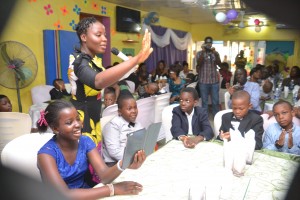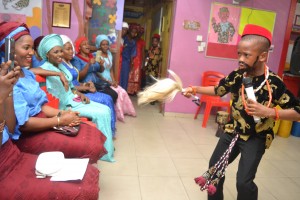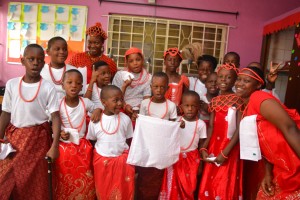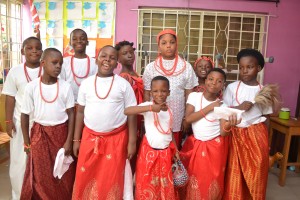PARENT TESTIMONIAL
Here in King’s School Lagos, our aim is that “Each child achieves success in school on a daily basis, and to develop the interests and habits of each child to its’ full potential”, that’s why it gives us great joy when our parent’s share of our visible and astonishing effort in the developments of their children.
This past week we received a message from one of our parent. She shared with us a lovely testimonial, expressing her joy in the incredible performances of her children, and we wanted to share it with you all!
“I really must commend Kings school, the teachers & u for efforts in educating Alfred& Fiona , they are passing their subjects with high grades. Alfred has been changed to a higher class after 2 weeks of resumption cos his former class wasn’t challenging & every topic was too easy for him . Thank you once again . We appreciate u guys. (Mrs Dabiri)“
DEBATE! DEBATE!! DEBATE!!!
Over 100 people in attendance.
4 schools.
8 participants.
1 winner.
“For good ideas and true innovation, you need human interaction, conflict, argument and DEBATE“.
These words by Margaret Heffernan is undoubtedly true as many an idea have been established at round-table discussions on the ‘pros’, ‘cons’, benefits and challenges that may arise from execution of said idea.
Knowing that education goes beyond the four walls of a classroom, The King’s School Lagos has organized a DEBATING COMPETITION on the topic HEREDITY DETERMINES THE INTELLIGENCE AND BEHAVIOUR OF THE CHILD, NOT THE ENVIRONMENT on the 22nd November, 2018.
Stay tuned for action pictures and news on the winners of the competition.
7 ways to teach children good manners
It may appear that manners have taken a downward slide in priority over recent years. The fact remains however, that instilling the principles of good manners in young children is exceedingly important. Understanding and using good manners has so many positives: it shows courtesy and empathy towards others; indicates thoughtfulness, and reflects on the child’s upbringing and education.
Fundamentally, good manners are necessary for people to get along together in this world. Here are seven ways you can encourage a child to be gracious and well mannered.
Introduce polite words from a young age
Children as young as two can learn to say “please” and “thank you”. Despite not fully understanding the implications of using these words, children can learn from a very early age that “please” must be attached to asking for things, and “thank you” always comes at the end of a transaction or interaction. As the child develops further, they will understand that these words make other people feel good about helping you.
Respect and sensitivity
In summary, good manners stem from respect for another individual, and the route to respect is essentially sensitivity. If you can teach a child the value of sensitivity, you are giving them a wonderful gift. A sensitive infant who develops awareness of others and their feelings, will grow into a respectful child. And a respectful child naturally becomes a well-mannered individual. Good manners become logical to them and not something they have to learn artificially.
Master five important phrases
Along with “please” and “thank you”, ensure that children understand that “excuse me”, “May I…” and “no, thank you” are also required in everyday life and must be mastered.
Make sure you always include a lot of “please” and “thank you” and the other important phrases as you interact with people in daily life. From the ages 2 to 4, children will mirror what the adults around them are saying. Remember also to address your child and other children with the same good mannered phrases so that they catch on to this polite behaviour.
Acknowledging children in public places
When out and about, including the child in activities and conversation helps them to feel acknowledged, and reduces any desire to “act out” for attention. Acknowledging and interacting with the child, particularly if there are few other children present, also opens opportunities to educate them about appropriate social behaviour. Make sure that education about noise levels, meeting new people, respect for property, privacy and personal space are a big part of fun activities with your children in public.
Correct on the spot
The best way to learn is by making mistakes, and so by correcting children ‘in action’ they can get a deeper appreciation of manners and how to apply them. Some examples include:
- If you are having a conversation and a child interrupts you, gently point out that this is inappropriate behaviour and how a place in the conversation might be achieved politely.
- If a child yells in public, insist that they lower their voice and let them know why this is, e.g. there are people reading or enjoying lunch nearby.
Correct a child politely
Be careful how you go about correcting children because correcting a child aggressively or in front of others can be a form of rudeness in itself. The idea is certainly not to ‘make an example ‘of the child. Consider the situation you are in, and if appropriate, move the child away to a more private area to explain your corrections.
Avoid getting in the habit of yelling out to a child if they are doing something wrong. Instead, ensure that you get close to the child, maybe even bending or squatting to their level to gain eye contact, and speak in a low and relaxed voice. Communicating this way indicates to the child that you are treating him or her with dignity, respect and that you genuinely want them to improve. Hopefully, the child will embrace this behavior and grow up to do the same to others.
Are Headphones Safe for Your Children?
Compared to giant PA stacks at festivals and floor standing HiFi Speakers, headphones and earphones look small and harmless. But what matters is how much the sound makes your eardrums vibrate. In fact, most earphones can produce a louder sound at the eardrum than all but the largest and most powerful studio monitoring loudspeakers, and can easily give noise exposures well above the accepted safety limits.
Earphones don’t sound as loud as loudspeakers even when the sound level at the eardrum is the same. This may happen because the brain isn’t fooled into thinking the sound is “outside” – it can work out that that the music is right next to your head and so expects it to sound loud and compensates.
Unlike loudspeakers neighbours will not complain if kids are listening at high volumes, with earphones people can get an excessive dose of sound without themselves or anyone else realizing it! You can’t assume that equipment made for the domestic market will be safe to do a lot of listening. A 2010 study found that an iPod Nano set on maximum volume, using the standard ear-buds, produced a one-hour average sound level of 96 dB with a popular album, a higher average than is allowed in the workplace.
Medical Studies:
Researchers at Boston Children’s Hospital determined that listening to a portable music player with headphones at 60 percent of their potential volume for one hour a day is relatively safe. For continuous noise exposure such as music, the level and duration of exposure are important. It takes repeated exposures over many years to cause a gradual onset of noise-induced hearing loss in both children and adults
Portable music players have sparked recent concern since they are used frequently and with earphones that deliver the sound directly to the ear. This is however not the whole of the story as the MP3 player used is not the only factor in deciding the actual volume at the ear. Headphones themselves have an electrical resistance, the higher this resistance the lower the volume outcome for the power of the MP3 Player. Choosing Headphones correctly can stop hearing damage from occurring at all.
MP3 players were investigated thoroughly by Portnuff, a graduate student at the University of Colorado, and Fligor, Director of Diagnostic Audiology at Children’s Medical Hospital and Harvard Medical School in Boston.
Portnuff and Fligor measured specific sound levels that come out of five common portable music players including the Apple iPod, the Creative Zen Micro and the SanDisk Sansa. For each player, they measured sound levels in music transmitted by several different types of headphones. Interestingly, they found that all five music players output very similar sound levels, especially at the highest volume levels. The highest volumes can be so dangerous that the researchers only recommend listening at those levels a few minutes a day, if at all.
“Damage to hearing occurs when a person is exposed to loud sounds over time…the risk of hearing loss increases as sound is played louder and louder for longer durations.” explains Portnuff.
“It is important to note, though, that not everyone shares the same risk of hearing loss,” Portnuff explains. Some people have “tougher” ears, for them the recommendations are overly cautious. For other people with more “tender” ears, these recommendations do not eliminate the risk of hearing loss.
Effects on preschool children and schoolchildren:
The following effects on preschool children and schoolchildren have been considered by researchers from around the world:
. Hearing impairment
. Effects on sleep
. Stress-related somatic effects
. Cognitive effects
. Vocal nodules
Noise-induced somatic effects (such as on blood pressure and hormone levels) can best be considered as part of a stress response of children to their noisy environment.
Psychological and cognitive processes also play a role in this stress response of children. Somatic (physiological) results should therefore be considered together with psychological outcomes to give an overall insight in the problem. As in adults, children can react very differently to stimulus. Some children can find loud noises terrifying whilst others do not seem bothered, this is not an indication that damage is or is not occurring.
How can I Protect Children from excessive noise in Headphones?
If children will be using portable audio equipment (you try to stop them!) then responsible parents will want a safety method that limits noise exposure without constant supervision. Protection in the form of powered adapter using signal processing to significantly enhance the user’s listening comfort is a safe method but requires batteries to work. Modern headphones are usually very sensitive as they have to work with battery powered mp3 players and similar devices. So when you plug them into a mains operated unit they can usually produce very high sound levels!
Passive Acoustic limiting technology is beginning to appear more readily (dB Logic Childrens headphones) which is a form of protection which pulls volume back in response to high sound pressure levels. This technology is likely to become commonly recommended for children as there are no batteries and the units are very robust and resistant to play use.
THE GOOD AND BAD EFFECT OF TV ON CHILDREN
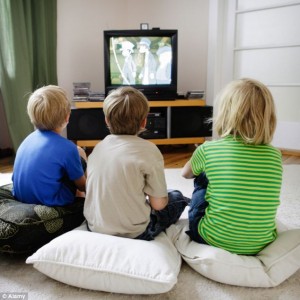
It is hard to avoid television if you are a kid. People in the house are usually tuned in to TV – siblings as well as parents. In some homes, the television is perpetually “on” even without anyone watching. It is common for parents and caregivers to use TV as a substitute babysitter. Also, many parents buy videos that they think can make their kids smart. But how does watching TV really affect children?
The bad news is, the majority of experts think that a TV/video-driven culture has bad effects on kids – and may prevent kids from being smart. They cite the following:
TV provides no educational benefits for a child under age 2. Worse, it steals time for activities that actually develop her brain, like interacting with other people and playing. A child learns a lot more efficiently from real interaction – with people and things, rather than things she sees on a video screen.
TV viewing takes away the time that your child needs to develop important skills like language, creativity, motor, and social skills. These skills are developed in the kids’ first two years (a critical time for brain development) through play, exploration, and conversation. Your kid’s language skills, for example, do not improve by passively listening to the TV. It is developed by interacting with people, when talking and listening is used in the context of real life.
TV viewing numbs your kid’s mind as it prevents your child from exercising initiative, being intellectually challenged, thinking analytically, and using his imagination.
TV viewing takes away time from reading and improving reading skills through practice (Comstock, 1991). Kids watching cartoons and entertainment television during pre-school years have poorer pre-reading skills at age 5 (Macbeth, 1996). Also, kids who watch entertainment TV are also less likely to read books and other print media (Wright & Huston, 1995).
According to Speech and language expert Dr. Sally Ward, 20 years of research show that kids who are bombarded by background TV noise in their homes have trouble paying attention to voices when there is also background noise.
Kids who watch a lot of TV have trouble paying attention to teachers because they are accustomed to the fast-paced visual stimulation on TV. Kids who watch TV more than they talk to their family have a difficult time adjusting from being visual learners to aural learners (learning by listening). They also have shorter attention spans.
School kids who watch too much TV also tend to work less on their homework. When doing homework with TV on the background, kids tend to retain less skill and information. When they lose sleep because of TV, they become less alert during the day, and this results in poor school performance.
A long-term study conducted by the Millennium Cohort Study and published in 2013 found that children who watched more than 3 hours of television, videos, or DVDs a day had a higher chance of conduct problems, emotional symptoms and relationship problems by age 7 than children who did not. Notably, they did not find the same problem with children who played video games for the same amount of time.

TV exposes your kid to negative influences, and promotes negative behavior. TV shows and commercials usually show violence, alcohol, drug use and sex in a positive light. The mind of your kid is like clay. It forms early impressions on what it sees, and these early impressions determine how he sees the world and affect his grown-up behavior. For instance, twenty years of research has shown that children who are more exposed to media violence behave more aggressively as kids and when they are older. They are taught by TV that violence is the way to resolve conflict – as when a TV hero beats up a bad guy to subdue him.
Kids who watch too much TV are usually overweight, according to the American Medical Association. Kids often snack on junk food while watching TV. They are also influenced by commercials to consume unhealthy food. Also, they are not running, jumping, or doing activities that burn calories and increase metabolism. Obese kids, unless they change their habits, tend to be obese when they become adults. A recent study confirms this finding, suggesting that even just an hour of TV is associated with childhood obesity.
How To Discipline Your Child
How to Make Your Kids Do Homework
(Without Having a Nervous Breakdown Yourself)
Tired of arguing, nagging, and struggling with your kids to get them to do homework? Are you discovering that bribing, threatening, and punishing don’t yield positive results? If so, this article is for you. Here you will find the three laws of homework along with eight homework tips that — if implemented in your home with consistency and an open heart — will reduce study time hassles significantly.
The First Law of Homework: Most children do not like to do homework.
Kids do not enjoy sitting and studying, at least not after having spent a long school day comprised mostly of sitting and studying. So give up your desire to have your child like it. Focus on getting him or her to do it.
The Second Law of Homework: You cannot make your child do it.
You cannot make your child learn. You cannot make your child hold a certain attitude. You cannot make your child move his or her pencil.
While you cannot insist, you can assist. Concentrate on assisting by sending positive invitations. Invite and encourage your child using the ideas that follow.
The Third Law of Homework: It’s your child’s problem.
Your child’s pencil has to move. His or her brain needs to engage. Your child’s bottom needs to be in the chair. It is your child’s report card that he or she brings home.
Too many parents see homework as their own problem. So they create ultimatums, scream and shout, threaten, bribe, scold, and withhold privileges. Have you noticed that most of these tactics don’t work?
The parent’s responsibility is to provide his or her child with an opportunity to do homework. The parent’s job is to provide structure, to create the system. The child’s job is to use the system.
Tip #1
Eliminate the word “homework” from your vocabulary. Replace it with the word “study.” Have “study” time instead of “homework” time. Have a “study” table instead of a “homework” table. This word change alone will go a long way toward eliminating the problem of your child saying, “I don’t have any homework.” Study time is about studying, even if your child doesn’t have any homework. It’s amazing how much more homework kids have when they have to study regardless of whether they have homework or not.
Tip #2
Establish a study routine. This needs to be the same time every day. Let your child have some input on when study time occurs. Once the time is set, stick to that schedule. Kids thrive on structure even as they protest. It may take several seeks for the routine to become a habit. Persist. By having a regular study time, you are demonstrating that you value education.
Tip #3
Keep the routine predictable and simple. One possibility includes a five-minute warning that study time is approaching, bringing your child’s current activity to an end, clearing the study table, emptying the backpack of books and supplies, and then beginning.
Tip #4
Allow your child to make choices about homework and related issues. He or she can choose to do study time before or after dinner or immediately after getting home. Or your child may choose to wake up early in the morning to do it. Invite your child to choose the kitchen table or a spot in his or her own room. One choice your child does not have is whether or not to study.
Tip #5
Help without over functioning. Help only if your child asks for it. Do not do problems or assignments for your child.
When your child says, “I can’t do it,” say, “Act as if you can.” Tell your child to pretend that he or she knows what to do and to see what happens. Then leave the immediate area, and let your child see if he or she can handle it from there. If your child keeps telling you he or she doesn’t know how and you decide to offer help, concentrate on asking rather than on telling.
Ask:
“What do you get?”
“What parts do you understand?”
“Can you give me an example?”
“What do you think the answer is?”
“How could you find out?”
Tip #6
If you want a behavior, you have to teach a behavior. Disorganization is a problem for many school-age children. If you want your child to be organized, you have to invest the time to help your child learn an organizational system. Your job is to teach the system. Your child’s job is to use it. Yes, check occasionally to see if the system is being used, especially at first. Provide direction and correction where necessary.
If your child needs help with time management, teach him or her time management skills. Help your child learn what it means to prioritize according to the importance and due date of each task. Teach your child to create an agenda each time he or she sits down to study. Help your child experience the value of getting the most important things done first.
Tip #7
Replace monetary and external rewards with encouraging verbal responses. End the practice of paying for grades or rewarding with a special trip for ice cream. This style of bribery has only short-term gains and does little to encourage children to develop a lifelong love of learning.
Instead, make positive verbal comments that concentrate on describing the behavior you wish to encourage. For example:
“You followed the directions exactly and finished in 15 minutes.”
“I notice you stayed up late last night working on your term paper. It probably wasn’t easy saving that much for the end, but your efforts got it done.”
“All your letters are right between the lines. I’ll bet your teacher won’t have any trouble reading this.”
“I see you got the study table all organized and ready to go early. Looks to me like initiative and responsibility hooked together.”
Tip #8
Use study time to get some of your own responsibilities handled. Do the dishes, fold laundry, or write thank you notes. Keep the TV off! If you engage in fun or noisy activities during that time, your child will naturally be distracted. Study time is a family commitment. If you won’t commit to it, don’t expect your child to do so.
Special Note: Tonight when your child is studying, begin on your homework assignment, which follows. Reread this article. Decide which parts of it you want to implement. Determine when you will begin. Put it in writing. Then congratulate yourself for getting your homework done.
Wriiten By Chick Moorman and Thomas Hallerhttp://www.personalpowerpress.com/
The King’s School Celebrates World Food Day
October 16th, around the world is known as the World Food Day, an action against hunger.
The United Nations on this day declares their commitment to eradicate hunger to the only acceptable number in the world which is zero.
This year, the Pupils of The King’s School Lagos volunteered to take part in the “Feed a Child Program” organized by The Kings Children Foundation a charitable organization that organizes series of feeding programme for children in selected public schools.
The programme, which has kicked off in Gbagada Lagos since 2003 involves feeding over 500 children in three selected public schools every week
International Day of the Girl Child
11 October, 2016
The International Day of the Girl Child gives people and organizations the opportunity to raise public awareness of the different types of discrimination and abuse that many girls around the world suffer from. On this day at THE KING’S SCHOOL LAGOS a documentary on was the importance of girls’ right to equal education and their fundamental freedom was shown to the pupils.
World Teachers’ Day 5th October 2016
Teachers are given the divine ability to impart knowledge , which is the greatest skill any human can possess. Today We celebrate The World teacher’s day at The King’s School Lagos.Teachers had a relaxing day as they watched pupils get to enact as one of their teachers,and Pupils also got the chance to select a topic to teach the class , in the manner that the teacher would teach it.!! HAPPY TEACHER’S DAY FROM THE KING’S SCHOOL!!!
SUMMER SCHOOL 2016@ THE KING’S SCHOOL LAGOS
OUR VALEDICTORY DINNER 2016
It was the first of its kind aimed at celebrating the out-going graduating pupils. It was a pleasurable moment for teachers and pupils to reminisce on and bond over memorable occasions while their taste buds relished the beautiful flavours of the meals shared in their honour. see pictures below-
THE SATURDAY READING CLUB @ THE KING’S SCHOOL LAGOS
The Reading Club held 0n the 18th of June 2016 at the King’s school premises was fun (and free!) for kids between the ages of 4-12 years.The program comes up every 3rd Saturday of the month.children from various community and schools in Lagos attended the program.for further enquirers on how parents or guidance can to enroll their children(child) visit the contact menu on the KING’S SCHOOL LAGOS website www.thekingsschoollagos.com or you can visit the office at n0 24/26 Mabiniori Dawodu Street.Gbagada Estate Phase 1,Lagos.or call: 08033117630
PICTURES FROM THE SATURDAY READING CLUB.
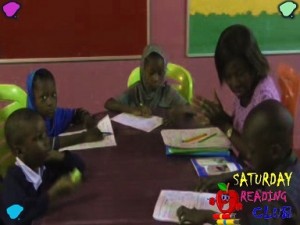
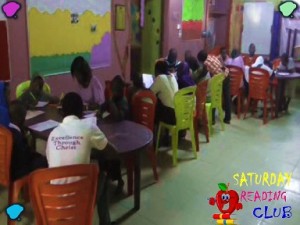


OUR TODDLER’S FRUIT DAY! (15th of June 2016)
The fruit day was a special day for The king’s school toddlers to recognize the types of fruits and their colours! The children were excited as they learned to identify and tasted the various fruit what a yummy day in school! ….see pictures below
OUR CULTURAL DAY!
The King’s school Lagos cultural day was held on the 10th of June 2016 for the purpose of promoting the Nigerian culture, the arts, ethnic groups, traditional attire and food. Festivities typically included was drama, food exhibitions, parades etc presented by the pupils .see pictures below….






